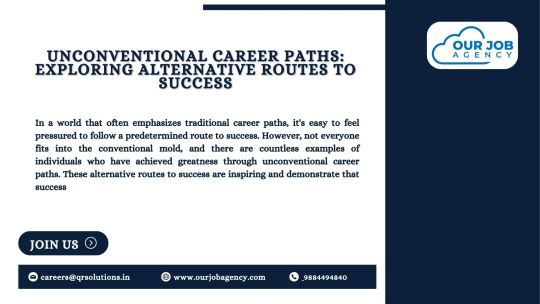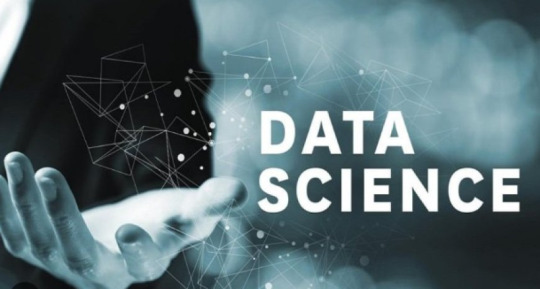#Non-linear career progression
Explore tagged Tumblr posts
Text

In a world that often emphasizes traditional career paths, it's easy to feel pressured to follow a predetermined route to success. However, not everyone fits into the conventional mold, and there are countless examples of individuals who have achieved greatness through unconventional career paths. These alternative routes to success are inspiring and demonstrate that success
To Know More Visit Us:
#Unconventional career paths#Alternative routes to success#Non-traditional careers#Unique career choices#Unorthodox professions#Exploring non-mainstream careers#Non-conventional success stories#Alternative career trajectories#Non-traditional job opportunities#Success in unorthodox fields#Divergent career journeys#Unusual career pathways#Non-conformist professions#Non-linear career progression#Pioneering career choices#Thinking outside the traditional job market#Success beyond the mainstream workforce#Breaking the mold in career choices#Pursuing passion over convention#Innovators in unconventional careers
0 notes
Text
Ruler of the 2nd through the houses
when you track the ruler of the 2nd house through the houses, you’re looking at how you make money, where your values lie, what you prioritize, and what brings you a sense of security and self-worth.
1st House 🏡:
I am the resource.
Your body, presence, or identity is a source of value. You might attract wealth through personal branding, entrepreneurship, or just being YOU. Confidence = currency. You naturally radiate value, but must learn to own it.
2nd House 🏡:
Born to build.
This is a powerful placement for money, stability, and long-term growth. You naturally know how to build wealth and manage your resources. You’re probably very grounded and value quality over quantity. Shadow side hoarding, fear of change, or stubbornness.
3rd House 🏡:
Money through the mind.
Your voice, ideas, or communication skills are your goldmine. You might make money through writing, teaching, media, or even tech. You value curiosity, mental stimulation, and versatility. Prone to having scattered energy or difficulty monetizing ideas. Your Strength = quick thinking, adaptability, networking = resource magnet.
4th House 🏡:
Home is the foundation of wealth.
You could inherit money, make money through property, or work from home. Emotional security and family support directly affect your money flow. Your values are deeply rooted in your upbringing.
5th House 🏡:
Creative currency.
You attract money through self-expression, creativity, pleasure, or even romance. Think artists, performers, designers — or people who monetize their passions. You value joy, fun, and being seen. Shadow side here = risky money behavior; tying worth to external validation.
6th House 🏡:
Work = worth.
You build wealth slowly and steadily through dedicated effort, skill development, and service. You might work in healing, wellness, administration, or service industries. You value discipline and reliability. Overworking or tying self-worth to productivity may be a problem for you. Relax and give urself grace.
7th House 🏡:
Money through others.
Your values and income may come through partnerships, collaborations, or clients. Business and romantic relationships affect your money deeply. You value harmony, balance, and reciprocity. Be careful of falling into financial dependency or people-pleasing around money.
8th House 🏡:
The wealth alchemist.
You’re drawn to shared resources, investments, and transformative wealth. You might make money through occult work, finance, psychology, or sex-related fields. Power, trust, and depth play a big role in your money story.
9th House 🏡:
Expand to receive.
You attract abundance through travel, teaching, spirituality, law, or publishing. You value freedom, knowledge, and growth. Belief systems around wealth are HUGE here — mindset is everything.
10th House 🏡:
Public success = personal wealth.
You may gain money and security through career, status, or reputation. You value ambition, recognition, and doing something that matters. This placement often pushes you toward visible leadership or high positions.
11th House 🏡:
Money through the collective.
You earn through networks, innovation, tech, or social causes. Think online businesses, group work, or digital platforms. You value progress, originality, and future-oriented thinking. Be careful of being overreliance on external validation or digital platforms. Your unique ideas, group alignment, big-picture wealth building is where it’s at.
12th House 🏡:
Mystical money flow.
This is the most non-linear placement. You may make money through spiritual work, healing, art, or behind-the-scenes roles. Money may come and go mysteriously, and your values are more ethereal than material.
#astro notes#astrology#birth chart#astro observations#astro community#astrology observations#astrology community#astrology degrees#astro#astroblr#2nd house#houses in astrology#astrology content#astrology insights
753 notes
·
View notes
Text
crush
cairo sweet x fem!reader (no pronouns used)
summary: when cairo goes home, what comes to mind are thoughts of you. wc: 2.3k tags: explicit, minors DNI!! all characters 18+. university au. masturbation, smoking, non-linear narrative. reader is cairo’s teaching assistant, reader described as masc presenting. a/n: let me know what y’all think :) for the vibes
masterlist

“Is Professor Miller not coming?” Winnie had just dropped into her unassigned assigned seat next to Cairo, two minutes before Greco-Roman Literary Theory started. The flipping of pages punctuated the chatter of other students waiting, a comfortable sound.
“He said he’d be gone today,” Cairo replied absently. “There’s a ‘guest lecturer,’ our teaching assistant.”
“Oh, right. Who’s that?”
Cairo shrugged. “Who knows.”
As if on cue, the door swung open. Cairo didn’t even look up—Miller mentioned that he kept a handful of research assistants that would be there to help with the advanced reading. But honestly, Cairo wasn’t sure what they could tell her that she didn’t already know. A melodic hum fell through the air for just a moment, a chorus.
“Good morning.” At your lilting voice, rough with the edge of 10am, Cairo started. She watched you set your messenger bag on the desk. Your white shirt pulled over your shoulders; there was a glint at your collar, a necklace peeking through. A thin watch adorned your wrist. Winnie, along with some of the class, echoed your greeting, and Cairo blinked.
Late spring afternoon draped across the furniture in Cairo’s room, the quickly waning light giving easy way to a blue hour. Dropping her bag at the door, she tore off her shirt and skirt with the confidence of one standing before a crowd. Running a hand up from her sternum to her neck, she stretched languidly, sinking down onto her bed. After so many uneventful days—when she applied to Yale, she didn’t think that there would be any uneventful days—she finally had a story to turn over in her mind.
You. You were a mystery. Even as you had started the class with an introduction, telling Cairo you’d graduated from a middle-of-nowhere college in California and sought a writing career in Vermont before delving into research, she longed to lay out the details and pull them out from under the rug. Where did you learn to teach? Did you like to drive, or be driven? Mountains, or the sea? Where did you grow up? Was there coffee or tea in your cupboard? Cairo’s stomach burned to know. Her dark eyes burned the ceiling with smoke signals, searching for you even though you were god knows where in that seaside state.
Arching her back, Cairo let her hand travel down, palm flat against her stomach, to trace the seam of her upper thigh. As the class had progressed, your keenly observant nature did not elude Cairo. Maybe listening was something that your pedagogy instilled in you, but the way you held each student’s question in the cant of your head, an answer in your crinkling eyes, listening seemed to be in your nature. It was meticulous, the way you picked apart the class text, weaving in references and tying it all in. In that two hour lecture, Cairo learned that you watched the same way you listened.
Balmy as it was, the humidity made her dark waves cling to her skin, and she shivered as she brushed them back, thinking of a different pair of slim hands. Your scrutiny of each student had an intention that she couldn’t quite place; a determination that thrilled her. Cairo imagined that you’d observe her the same way, that she would be the one you were most fond of. It was only natural that her own attention would draw yours onto her. Holding the weight of your envisioned gaze made Cairo’s core twist, a pleased little flush that she prayed you could see. Your affected impartiality didn’t bother Cairo—in fact, it pulled her into your shadow. In her bed, she rolled onto her stomach then her knees, shaking her hair out.
Her hands were steady as she reached for her bedside table, thumb rolling on the wheel of her zippo as she held the cigarette to her lips. Cairo took a drag, blowing out neat smoke rings as she settled back on her heels. The skin of her own fingers was cool against her lips, and when she took the smoke away, she studied the pattern of her lipstick on the white paper as she had so many times before.
She’d watched, unabashedly and unafraid of being caught, as you drummed your fingers on the chalk tray. Would your fingertip be soft or work hardened if it pressed down her tongue? Would your skin carry the stain of her red lip as deeply, as obediently, as the malleable wrapping paper?
“Alright, class,” you cleared your throat, turning slowly around the room to make eye contact with each student. “As you know, Jonathan’s away on a conference today. I’ll start with a bit of roll, just so I can learn your names. Not many of you come to my office hours, I know.” You smiled easily. It was so guileless, Cairo mused, nearly childlike. You had the class go around the rooms with names and majors, a circuit that Cairo gave no attention to other than your lilting rhythm of hums, the tapping of your foot on the floor, the way you flicked the corner of the role sheet with your thumb. Your gaze was soon on hers, waiting expectantly. She looked right back with a blink.
“Cairo Sweet. English major.”
“Cairo.” Her name rolled off your innocent little grin, making her cock her head. “Wonderful.” Fascinating. Would you whisper midnight black desires in her ear, so deep and dark they might be murmured into the ink of your own empty room?
You continued, circling back to the front and easily transitioning to the lesson plan. You had an awfully effortless way of grasping the class’ attention, holding gently and never forcing. It wasn’t like Professor Miller, who always seemed to hasten through the lecture so he could return to his research. She could tell you liked the woods of the text, to fall down into the depths of each word, feeling its weight in you and letting it rock. Just like Cairo.
She sighed into the warm air prickling up her skin, the curl of your voice around her name making her nipples harden in her bralette, even in retrospect. Exhaling around her cigarette, Cairo brought her hands up to palm her breasts, feeling the drag of her rubied nubs on her palms. Was it the high of the nicotine, the blur of smoke ridden air that made her float straight up into the lofty space you’d created in her mind? Though the feel of her own fingers scraping the lace against her skin was familiar, she found herself keen to think of your soft or callused hands. She was wet already, and she couldn’t remember the last time she’d gotten wet so fast.
The weight she imagined of your touch on her flushed skin was completely, deliciously foreign. Unbidden but intimately welcome, Cairo wished that your caress would find the map of her chest as familiar as a classic, something you had searched a million times over yet always managed to find something new. Shamelessly, Cairo trailed her fingers down her stomach, nails catching on every rib as she arched her back in the spilled moonlight. The mystery in the crossing of your long legs as you’d leaned back on the desk climbed up her belly, curling in the thump, thump, thump, of her heart. The uneven roll of your sleeves clung to the corners of her eyes, eidetic and oh, so, tempting. She had watched you so ardently—did you like to watch? Would you watch?
The space between her thighs was achingly empty, craving the set of your narrow hips. She was comfortable there, and she remembered the taut stretch of wool as you dropped into your chair and set one ankle over your knee. There was something endearing about the way your trousers had pulled up to reveal slouchy black socks, and darker her mind went as the material pulling creases around your lap made her shudder and—she reached behind to pull one of her fluffy pillows under her, smoke billowing into the air.
Cairo gave her hips an experimental roll, imagining it was the soft fabric of your slacks against her aching cunt, and grinned around her cigarette. Unlike the pillow, you would be ever so solid under her, grabbing for her thighs like a dog yearns to please. Were you more likely to bruise her skin, yanking her into you without care for blood—or would you guide her gently, make a home in her innocence and hold her more dearly than life ever could? Either way, your desire for Cairo would be so apparent that you couldn’t help yourself.
The dip of your tongue in her navel, the little smirk you’d undoubtedly wear as you went down further—would you go for her throbbing clit first, or would your lips press so warm—she didn’t know. She didn’t have to, content with all those different versions of you unfurling before her. In her bedroom, each time she moved her hips, it became easier to imagine you guiding her actions, the bump of your nose on her folds, damned if not addicting.
Cairo grinned as she fell onto her forearms, hips pushing into the soft pillow without abandon. The slide of her panties soaked with slick against her sensitive clit felt like the delicate press of your splayed hand on her desk as you’d passed, eyes occupied by the text you were holding. It had only been a split second, but it was enough for her to memorize every crease, every vein. Cairo let out a whine, a demanding little sound, as her movements grew erratic. Looking up into the heaven where you must be, she imagined that you’d murmur to her, “I’m here, I’m here, how could I be anywhere else but here?” as you traced the dip in her back. Her arousal took her down every sullied path she’d ever dreamed of, but her mind stuck on one gesture that made her mouth go dry.
She remembered the way your shirt got just a bit untucked when you stretched during the class break. You’d instinctively tucked it back in, quick as you surveyed the class. Cairo thought that you’d dress yourself back up the same way after you bent her over the desk after class, pushing her skirt up and shoving your fingers into her, painting bruises onto her hip bones with how tight you held her.
The two of you would share a mutual understanding that she wanted this, wanted it bad enough for you to take it whenever you saw fit. Cairo decided that today, this time, you’d be as rough as you pleased, a cup of pens clattering to the ground as you pushed her down, forearm across her shoulder blades. Your necklace would be cold on her warm skin, would it be cold on her tongue? You’d put two, three fingers inside, humming in that absentminded way you did. She thought you’d nuzzle into her ear, all lips and sharp teeth, asking if she’d sprayed your favorite hair mist of hers because she hoped you’d notice—she did—and take her, break her, whatever you wanted.
You’d send her plummeting down towards a deeper hell (or was it higher, up to your majestic heaven?), already knowing everything that her body needed. Cairo imagined herself coming so helplessly around the stretch of your fingers, so high strung from nights of trying to mimic the press of your touch on her clit, unable to reach the same heights you sent her to. As she held back tears, eyes on the ceiling in reverence, feeling herself drip to the floor, you’d sigh as your mind wandered to other things already, carelessly running a hand down her back.
Cairo gasped, dropping her nearly finished cigarette in favor of gripping the bed sheets. The white fabric wrinkled around her fingers, reminiscent of your shirt creasing as you’d rolled your sleeves up. This was something new you could show her, just how fast she could come and just how wet it made her. It was a marvel, feeling the fabric cling to her cunt, almost as good as how you’d feel. Resting her forehead in the crook of her elbow, she murmured your name over and over again, a little susurrus of a litany, so similar to your preoccupied hum. Panting, Cairo giggled in her bliss, soft and bright as Californian oranges clinging to rich leaves. You were dark enough to be tucked into the wrinkles in the soft pillow, dark enough for Cairo to love, as a journal loves a secret.
Sated, Cairo grabbed her phone and typed your name in. The results spilled out, and she scrolled, looking for all of the details in the background of your social media posts, curiously drunk on the year’s gap in your CV. Cairo noticed the perfect little circle where the cigarette had burned when she dropped it, and she brushed away the remnants. The gesture smeared the ash on the sheets.
—
Walking into your office with barely a knock, Cairo took in the familiar room of an academic, but with your unfamiliar knick knacks around the place. A lighter, a leather wallet, glasses and wired headphones. You didn’t look surprised as you glanced up from your laptop. Instead, you smiled.
“Cairo, isn’t it?”
A flush of pleasure shot straight into her—you remembered. She nodded. Your shelves were covered in books and stacks of reviews, the morning’s leftover cup of coffee sitting on one of the ledges. Did you smoke before, or after your coffee? The terrible, terrible want to replace the taste of smoke on your tongue with the taste of her gave Cairo just the confidence she needed.
“What can I do for you?”
Cairo leaned over your desk, watching the way your eyes dropped to her burgundy lipstick. “Would you be able to help me on the Aristophanes reading?” She pushed her copy of The Clouds towards you. “I can’t seem to grasp it.” Your eyes met hers. “Of course.”
--
a/n cont'd: can you read my mind, i’ve been watching you… there’s just something about you, baby… ♪ / hope you enjoyed @woewriting :)
please do not repost, reproduce, copy, translate, or take from my work in any way. thank you!
masterlist
#project wes#cairo sweet#jenna ortega#cairo sweet x reader#cairo sweet x female reader#cairo sweet x y/n#cairo sweet x you#cairo sweet x fem!reader#cairo sweet fanfiction#reader#reader insert#lgbtq#cairo sweet x reader smut#smut#self insert#jenna ortega x reader#cairo sweet x gender neutral reader#cairo sweet x gn reader#miller's girl#jenna ortega x reader smut#jenna ortega x fem!reader#jenna ortega x y/n#jenna ortega x gender neutral reader#lesbian#wlw
2K notes
·
View notes
Text
In news from a different world, last December J-pop idol Miho Nakayama passed away, quite shockingly so at the age of 54. I have no connection to her music or acting, but of course I do appreciate her role in the very early history of video game development and dating sims via the 1987 Famicom game Nakayama Miho no Tokimeki High School, which I have discussed before. I decided to play the game "in memoriam", as it were - it does in fact have an English patch, and you can see a playthrough of said patch on YouTube here. It was time to experience my very own 80's high school idol love story <3.

To the surprise of no one, this game sucks. It essentially had to, no real fault on the developers, but that doesn't change the facts. It is working with incredibly limited graphical capabilities of course, with the average scene looking like this:

Which just isn’t enough for “ambiance” immersion to work, every setting is generic by definition. That can of course be saved by a good plot or gameplay, but neither shows up here; there is barely any story to speak of. Main Guy goes to new school, meets “Mizuho”, realizes she is secretly pop idol Miho trying to live a normal life, they start dating, and paparazzi-types and the pressures of her career get in the way such that eventually (based on your route progression) she breaks up with you or you stay a couple and ride off into the sunset together. Literally by the way, a friend loans you a motorcycle so you can escape the press:

You might be saying “surely you are skipping some things” but I assure you it is nothing important. Neither Miho nor the main character have any personality to speak of, and your time is filled generally by comedic hijinks or just the mechanics of progressing the relationship. There is a fat-faced friend who gossips about school, you have a family that ~exists, there is a stuck-up rich girl you speak to about twice before she kidnaps you in order to serve you drugged food so you will date her (as was typical for 1980’s courtship norms) which happens solely to make you late for a date with Miho to create drama, and so on - it is all as tiresome as it is irrelevant. You can even poke your head into the girl’s locker room at some point, the crown jewel of filler content:

This isn’t even arcade-cabinet-strip-mahjong levels of hot, I know video games of the era could do better than this! Though for all the extraneous plot beats and side characters, I did like “The Trio”, a group of cackling girls who follow you around like a Greek chorus taunting you for your desires:

In another game these fey spirits would devour your organs at the right moment, mad respect.
Anyway, all of this plot filler is used to stretch out the non-story but in that task it gets a helping hand from the game mechanics, which are a classic example of arbitrary progression gatekeeping. Half the dialogue options are just variants of the same core emotion, and the right answer is inscrutable. You get moments like this one, where Miho is apologizing to you for a misunderstanding:

And all of these answers are pretty dismissive? But the right answer is A, the meanest of them! Guess she has a type, but since you as a player haven’t negotiated her safe words yet you don’t know that and are just gonna facecheck your way through these.
As the cherry on top the advertised “facial expression” system is actually a letdown - it is very rarely used, most dialogue options don’t ask for it, and when they do you have six options:

But you actually never use half of these, and 90% of the time the correct answer is “normal”. At least this was bad in a “too easy” way, so it doesn’t waste your time, but you could just remove it as a mechanic and miss nothing. All of the “interactive” elements could be replaced by linear narrative, actually, and nothing would be lost.
Besides the competitive media mix aspects of the game, obviously. Which is what it is all about, right? This ain’t some random 8-bit idol, this is Miho Nakayama! And even in-game she is pretty cute, I do like the design for the close-up convos:

The glasses-for-disguise are nice with her moe eyes, the details of the shading really pop in an 8-bit context, and really the whole framework of the UI as this sort of flip picture book is adding value here (as opposed to being irrelevant in the location shots). They even give her a bunch of different outfits on your dates because as the heroine she deserves it:



“Ash, those first two are literally just palette swaps” “No man, look, the red one is using dithering to create a fade effect on the colors, implying a more complicated pattern like plaid thatching, while the blue one uses bold lines to imply a striped coat”. It was impressive in 1987, alright! This girl has no textual personality but there is life in this design that stands out from its peers.
But of course it isn’t the in-game graphics doing the heavy lifting here. As mentioned before, this was a “Telephone Game”, where players would be prompted at times to call phone numbers Nintendo had rented out to hear voicemails Nakayama had recorded. These voicemails are, to the best I can tell, lost to us - I have not found an existing recording online. They were only up briefly actually, for a few months after the game was released - this was not an era where longevity for games was considered important. We do have transcripts of them though, and I can imagine that picking up your house phone, calling a phone number, and getting the actual voice of the “character” in the game talking to you - making your heart go doki doki if you will - must have been pretty cool.
(Miho even travels throughout the game, and the phone numbers - according to this blogger - actually use location-appropriate area codes so it feels like you are really calling Osaka or Hokkaido! Very cool…unless - according to another blogger - you got hit with long distance calling charges for your pursuit of troubled love, as was reported in the media at the time. Now that’s authenticity?)
This mechanic is essentially a ludomantic experience that is impossible to capture today, because voice acting in video games is incredibly common; so much so that it would come off as gimmicky to make someone go through such a multi-device process. But since the Famicom couldn’t make vocal sounds, it had to make you use your phone, which created the simulacrum of actually calling a real human outside of the game to talk to. That is pretty neat!
As mentioned, the media mix came bundled with a competition - the winners were the first 16,000 players to submit a “Best Ending” record via the barely-used Famicom Disk Fax system. As helpfully explained in the instruction manual alongside photos of the IRL Nakayama:

And the big prize of a VHS tape of behind-the-scenes Nakayama stuff has been preserved, and is easily available if you want to watch it. Don’t though, it isn’t worth it; it is primarily b-roll footage of her doing typical day-to-day tasks and softball interview questions about “what is her type” with generic answers, stuff like that. Solid C- for the genre. But still, you didn’t know that when competing, right? The pressure to get your game file in was fierce.
I mentioned how the game essentially “had to be bad” at the start, and I want to dig into why that is. In my initial post I linked, I actually made a false statement - I said the development time for the game was “2 weeks”. I said that because the game’s Wikipedia page in English says it and so it is common trivia on the net, but I don’t think that it is true. Even when I typed it in that original post, the back of my mind was going “wait, that can’t be literally true, it is very hard to make a game that fast in that era - these guys are coding in Assembly!”, but I sort of hand-waived it away as, oh something like they were harvesting an existing game prototype or somesuch. But I believe this fact comes from a mistranslation of interviews like this one:
岩田: 坂口さんは『ファイナルファンタジー』の開発を終えて、『トキメキハイスクール』に合流されたんですか? 坂口: ええ。チームの何名かが合流して、3カ月間くらいでしょうか。で、最後は10名くらいのメンバーといっしょに京都にやって来て、2週間くらいカンヅメになって、なんとか開発を終えることができたんです。
Or:
Iwata: Sakaguchi, did you join the "Tokimeki High School" project after finishing development on "Final Fantasy"? Sakaguchi: Yes, that’s right. Several team members joined the project for about 3 months, I think. And then near the end of development, about 10 of us came down to Kyoto and we holed up for around 2 weeks until we somehow managed to finish the game.
So what is going on here is the game’s development was a joint production between Nintendo - in Kyoto at this time - and up-and-coming game company Square in Tokyo. And yes, they were literally working on Final Fantasy right before this game, and switched gears to tackle this new project. Or at least some of them did, for 3 months, and then famed-director-of-Final-Fantasy Sakaguchi came down to Kyoto and lived out of a hotel for two weeks doing crunch to finish it off. That fact, probably because Sakaguchi is the famous person reporters would care about, got transformed into the idea that the whole game took 2 weeks to make.
In this same interview they talk about how, at the end of that crunch, they all went out for drinks to celebrate…until they got a phone call about how the motorcycle in the ending credits is glitching out and flying off the screen, which they thought was a hilarious, beautifully fitting bug for their time together. And that is hilarious, the primary reason I am recounting it, but I also think it goes to show that this was a hot mess of a game dev process. 2 weeks or ~3 months, both of those are not enough time. And with two companies in different cities, doing crunch out of a hotel, wrangling with a record label for a pop idol’s permission, setting up phone line recordings and VHS tapes and a bonus competition using experimental fax machines, all aligned with a media blitz? All for a game genre that honestly hadn’t been done before? I have checked, and you can authentically argue this is the first ever dating sim, at least on a console. People overstate what it is inventing - it is pulling tropes from romance anime and manga, of course - but even that process of transference is tough. This wasn’t a genre yet, and in a way they weren’t even trying to make a dating sim. They were trying to make an event.
One that today you just can’t experience. Very few people care about Nakayama Miho “like that” anymore, we aren’t seeing the commercials or the magazine ads or buying the discount unofficial strategy guide that invented a fake protagonist and never used Miho’s name because they didn’t have the rights. Today you play the game just because it is a game, and when you hit the phone numbers you tab over to a transcript of the voicemails…or maybe don’t even bother. The game was just a vessel for the hype. That doesn’t make the game good, by the way, I don’t want to go that far. The game was a not-very-good vessel for the hype, and an anachronistically better team could have made a better game. It isn’t really worth playing, in the end. But it is worth researching! As an event, it is really cool. As a piece of history, it is probably unique. And I respect the team behind it for that.
81 notes
·
View notes
Text
the classes | mandatory
------------------------------------------------------------------------------
date: march 23, 2025. 3:01 am. (starting). i fell asleep. lmao. 10:30
------------------------------------------------------------------------------





✧˖*°࿐ The Mandatory Classes
𓂃༊veltrius Lumos Academy's mandatory curriculum blends rigorous academics with cultural and artistic exploration. these courses ensure students develop critical thinking, research skills, creativity, and problem-solving abilities, preparing them for higher education and global careers.





✧˖*°࿐ Language Studies
𓂃༊students are required to take Haiqinian, Greek, and English throughout their academic journey.
*ೃ༄Haiqinian Language and Composition (3 years, Pre-AP & AP Available)
𓂃༊ Year 1 (Pre-AP or Regular Haiqinian Language & Composition I):
✧ 𓂃 › grammar & sentence structure: verb conjugations, syntax, and advanced sentence formation.
✧ 𓂃 › composition: essay writing, formal letters, and literary analysis.
✧ 𓂃 › literary study: introduction to Haiqinian classical and modern literature.
𓂃༊ Year 2 (AP or Regular Haiqinian Language & Composition II):
✧ 𓂃 › advanced grammar & writing: rhetorical devices, argumentation, and structured compositions.
✧ 𓂃 › comparative literature: study of Haiqinian texts alongside global literature.
✧ 𓂃 › research & analysis: writing research papers and learning source evaluation.
𓂃༊ Year 3 (AP or Regular Haiqinian Literature & Composition III):
✧ 𓂃 › critical literary analysis: deep dive into Haiqinian poetry, novels, and plays.
✧ 𓂃 › creative writing & public speaking: writing short stories, poetry, and persuasive speeches.
✧ 𓂃 › capstone research paper: a long-form thesis-style paper analyzing a Haiqinian literary work.
*ೃ༄Greek Language & Literature (3 years, required for all students)
𓂃༊ Year 1 (Greek I – Basic Grammar & Conversation):
✧ 𓂃 › introduction to the greek alphabet & pronunciation.
✧ 𓂃 › basic sentence structure: verb forms, nouns, and adjectives.
✧ 𓂃 › conversational skills: daily interactions, greetings, and essential expressions.
𓂃༊ Year 2 (Greek II – Intermediate Grammar, Translation & History):
✧ 𓂃 › complex sentence structures: subjunctive, conditional, and imperative verb forms.
✧ 𓂃 › translation practice: excerpts from Homer, Aesop, and historical texts.
✧ 𓂃 › greek culture & history: myths, political systems, and philosophy.
𓂃༊ Year 3 (Greek III – Advanced Reading, Writing & Translation):
✧ 𓂃 › advanced text analysis: works of Plato, Sophocles, and Aristophanes.
✧ 𓂃 › academic writing & discussion: essays on Greek mythology, ethics, and politics.
✧ 𓂃 › capstone project: a final presentation translating and analyzing a classical Greek work.
*ೃ༄English Language & Composition (2 years, English III is an elective)
𓂃༊ Year 1 (English I – General English Skills, Literature & Creative Writing):
✧ 𓂃 › grammar & vocabulary: structure, syntax, and advanced composition skills.
✧ 𓂃 › literature study: analysis of classic and modern English literature.
✧ 𓂃 › creative writing: poetry, short stories, and personal narratives.
𓂃༊ Year 2 (English II – Critical Thinking & Analytical Writing):
✧ 𓂃 › advanced literature study: British and American literature from different eras.
✧ 𓂃 › essay writing & rhetoric: persuasive essays, literary analysis, and argument development.
✧ 𓂃 › public speaking: presentations, debates, and discussions on literary themes.
𓂃༊ Year 3 (English III – Elective, Optional for Advanced Study):
✧ 𓂃 › world literature focus: exploring literature from South America, Asia, and Europe.
✧ 𓂃 › research & thesis writing: students write and defend a long-form literary thesis.
✧ 𓂃 › experimental writing styles: creative non-fiction, stream-of-consciousness, and hybrid prose.





✧˖*°࿐ Mathematics (3 years, AP Available)
*ೃ༄Core Math Progression:
𓂃༊ Year 1 (Algebra I w/ Probability – Pre-AP or Regular):
✧ 𓂃 › linear & quadratic equations: graphing, inequalities, and polynomials.
✧ 𓂃 › probability & statistics: basic probability theory, combinatorics, and statistics.
✧ 𓂃 › real-world applications: business forecasting, data analysis, and logical reasoning.
𓂃༊ Year 2 (Algebra II w/ Statistics + Precalculus – AP or Regular):
✧ 𓂃 › advanced algebra concepts: exponential/logarithmic functions, matrices, and conic sections.
✧ 𓂃 › statistics & data science: regression analysis, probability distributions, and data visualization.
✧ 𓂃 › pre-calculus introduction: trigonometric functions, sequences, and limits.
𓂃༊ Year 3 (AP Calculus + Finance or Regular Finance):
✧ 𓂃 › differential & integral calculus: derivatives, integrals, and applications in physics/economics.
✧ 𓂃 › financial mathematics: investments, banking, risk analysis, and economic modeling.
✧ 𓂃 › capstone project: using calculus and finance principles to analyze a real-world financial trend.





✧˖*°࿐ History & Social Sciences (3 years, AP Available)
*ೃ༄Year 1 (AP or Regular Haiqin History):
𓂃༊ linear & quadratic equations: graphing, inequalities, and polynomials.
𓂃༊ probability & statistics: basic probability theory, combinatorics, and statistics.
𓂃༊ real-world applications: business forecasting, data analysis, and logical reasoning.
*ೃ༄Year 2 (AP or Regular World History):
𓂃༊ advanced algebra concepts: exponential/logarithmic functions, matrices, and conic sections.
𓂃༊ statistics & data science: regression analysis, probability distributions, and data visualization.
𓂃༊ pre-calculus introduction: trigonometric functions, sequences, and limits.
*ೃ༄Year 3 (AP or Regular Government & Economics):
𓂃༊ differential & integral calculus: derivatives, integrals, and applications in physics/economics.
𓂃༊ financial mathematics: investments, banking, risk analysis, and economic modeling.
𓂃༊ capstone project: using calculus and finance principles to analyze a real-world financial trend.





✧˖*°࿐ Science Studies (3 years, AP Available for Some Courses)
*ೃ༄Year 1 (AP or Regular Chemistry):
𓂃༊ atomic theory & molecular structure: periodic trends and chemical bonding.
𓂃༊ thermodynamics & reaction kinetics: understanding physical and chemical reactions.
𓂃༊ lab work: hands-on chemical experiments, titration, and organic synthesis.
*ೃ༄Year 2 & 3 (Choice of Science, Must Take at Least One More):
𓂃༊ environmental science: climate change, ecosystems, and sustainable development.
𓂃༊ forensics: DNA analysis, fingerprinting, toxicology, and forensic anthropology.
𓂃༊ anatomy & physiology: human body systems, genetics, and medical applications.
𓂃༊ physics: classical mechanics, electromagnetism, and astrophysics.
𓂃༊ marine biology: ocean ecosystems, marine conservation, and field research.





✧˖*°࿐ Specialized & Cultural Studies
*ೃ༄AP or Regular Myths & Legends:
𓂃༊ greek & roman mythology: The Iliad, The Odyssey, Aeneid.
𓂃༊ comparative mythology: Norse, Celtic, Japanese, and Mesopotamian myths.
𓂃༊ symbolism & influence: how mythology influences modern media and storytelling.
*ೃ༄Astrology I (AP or Regular):
𓂃༊ foundations of astrology: birth charts, planetary movements, zodiac signs.
𓂃༊ cultural perspectives: astrology in Greek, Chinese, and Vedic traditions.
𓂃༊ scientific & spiritual debate: skepticism vs. belief, practical applications.
#reyaint#reality shifting#shiftblr#reality shifter#shifting#shifting community#shifting motivation#anti shifters dni#dr scrapbook#boarding school dr
56 notes
·
View notes
Text
i feel strangely heartbroken. i have made progress, and have good things in my life, but my barriers feel frustratingly insurmountable. the same damn things that have debilitated me for years. and the barriers are sometimes just, making the appointment. laser focusing my effort into creating a habit. and man i do get on here saying that exact same thing over and over again. through the years. its so frustrating i just wish the challenges i face in creating a better life didnt feel like mile high brick walls. and im just so goddam exhausted. so often it struggles to feel worth it. there are great things in my life, but the monotony of trying to like myself, to overcome sleep disorders, or move cities to kickstart my career, they just feel like asking me to fly. i know theyre possible. i thought cleaning was impossible and for some reason the last few months ive made so much progress there. years. years years years years i say that sverytime im on here to, im constantly in awe at how ancient i am. i know 27 isnt ancient, but when you have such a monstrously dissociative view of time, it is shocking! im so frustrated. im so tired of this shit, healing being non linear. why does it feel like fighting in vietnam trying to fucking vacuum. goddddddddd i wish i could get a heaping fuck ton of empathy and an army of proud parents everytime i push so hard to make mashed potatoes with my hot doh dinner, a side! its impressive!! gaaaaahhhh i have a horrifically infected finger and it feels so painful but i dont want go hopital aaaah anyways.
2 notes
·
View notes
Text
FIC MASTERLIST
completed
there’s glitter on the floor after the party — max/daniel. established relationship, relationship reveal. social media. (64.4 k)
Daniel returns to Red Bull and starts "soft launching" his relationship with Max across the 2023 - 2027 season.
↳ fic | rambles | asks | deleted scenes | commentary
please don’t ever become a stranger (whose laugh i could recognise anywhere) — max/daniel. getting together, non-linear narrative. (8.3k)
Prequel to glitter on the floor. Daniel invites Max to his farm during pandemic. Told partly through voicemails & texts.
↳ fic | rambles
fool me once — max/daniel. relationship reveal. social media implemented through work skins. (1k)
Daniel and Max have some news to share. It just happens to be April 1st.
↳ fic
takes one to know one — max/daniel. getting together, relationship reveal, singer!daniel. social media. (21.9k)
Daniel's a singer who goes semi-viral after a video of him reacting to his favourite driver's retirement blows up on social media. Max is the favourite driver. He has no idea who Daniel is, but he would love to find out.
↳ fic | rambles | extended author’s note
i'll never leave (never mind) — max/daniel. established relationship, hurt/comfort. post singapore gp (1.9k)
It was a bad idea in the end. to come back.
↳ fic | rambles
old habits die screaming — max/daniel. getting together, relationship reveal. social media implemented work skins. (52.9k)
Daniel comes back in 2028 as RB's team principal after retiring in 2023 due to his hand injury.
↳ fic | rambles | extended author’s note
hold onto the memories — max/daniel. glitter on the floor epilogue. social media.
An epilogue 20 years into the future focusing on Matilda's career to wrap up the glitter on the floor universe.
↳ fic | rambles
The Designated Alternate Universe Driver (DAUD) — max/daniel. getting together. alternate universe. parent trap-style shenanigans (16.4K)
Daniel doesn’t pass out when the 2025 DAUD is announced. Benjamin wishes he did. There was a whole bet going.
↳ fic | rambles | extended author's note
active work in progress
a habit to kick — matthew/callan.
In 2031, Callan is announced to be Mercedes' new driver, Matthew is decidedly not okay about it, Daniel just wants them to listen to him for once, and Max has given up on retiring in peace.
↳ rambles
click here for other works in progress/tumblr au's
12 notes
·
View notes
Text
Best Machine Learning Courses in Boston for Beginners and Non-Tech Backgrounds
Machine Learning (ML) is one of the most transformative technologies of our time—and Boston is at the forefront of this revolution. Whether you're a college student from a non-STEM field, a working professional in business or healthcare, or simply a curious mind without coding experience, there’s good news: you don’t need to be a tech expert to learn Machine Learning today.
With a growing number of beginner-friendly and affordable Machine Learning Courses in Boston, the city has become a hub for inclusive and accessible AI education. This guide explores the best courses tailored for non-technical learners and absolute beginners, offering flexibility, mentorship, real-world projects, and industry-recognized certification.
Why Boston Is a Great City to Learn Machine Learning?
Boston is home to world-class universities, innovative edtech institutes, and a thriving startup ecosystem. Its rich academic culture and proximity to leading AI research labs make it an ideal environment for anyone looking to break into machine learning—even without a tech background.
Reasons to choose Boston for ML education:
Access to instructors from Harvard, MIT, and top AI startups
A strong job market in healthcare, biotech, finance, and analytics
Bootcamps and institutes offering beginner-friendly, practical curriculums
Hybrid learning options (online + offline)
What to Look for in a Machine Learning Course as a Beginner?
If you're from a non-technical background, here’s what to prioritize in a course:
Foundational modules: Intro to Python, statistics, data visualization
Step-by-step teaching: Clear progression from basics to ML algorithms
Hands-on learning: Real-world datasets, projects, and assignments
Career support: Resume building, interview prep, mentorship
Flexible learning: Part-time, weekend, or self-paced options
No experience required: Courses that don’t assume prior coding knowledge
Boston Institute of Analytics (BIA) – Machine Learning & AI Certification Course
Why it’s perfect for beginners: Boston Institute of Analytics is one of the most beginner-friendly options available in the city. Its industry-driven curriculum, small class sizes, and real-world case studies make it ideal for learners with no tech experience.
Duration: 4–6 months
Format: Online + in-person hybrid options
Modules: Python from scratch, statistics, supervised/unsupervised ML, NLP
Projects: Capstone with real-time datasets (healthcare, retail, finance)
Certification: Globally recognized
Support: Dedicated mentorship, career counseling, placement assistance
What You’ll Learn as a Beginner?
Even with no tech background, these courses are designed to help you master:
Python Programming from scratch
Statistics and Probability for ML
Data Cleaning & Exploration
Linear and Logistic Regression
Classification, Clustering, Decision Trees
Natural Language Processing (NLP)
AI & ML use cases across industries
You'll also complete hands-on projects that may include:
Predicting customer churn
Fraud detection using machine learning
Text classification using NLP
Forecasting sales and demand
Frequently Asked Questions (FAQs)
Q1. Can I learn machine learning without a tech background?
Absolutely. Many ML courses in Boston start with Python and statistics basics, designed specifically for non-technical learners. With consistent practice and support, anyone can master it.
Q2. What are the career options after completing an ML course as a beginner?
You can pursue entry-level roles like:
Junior Data Analyst
ML Research Assistant
AI Product Analyst
Business Intelligence Analyst
With experience, you can move toward roles like Data Scientist or ML Engineer.
Q3. How long does it take to learn machine learning as a beginner?
With regular learning (10–12 hours/week), you can complete a beginner ML course in 4 to 6 months. Some part-time or immersive programs go longer but offer deeper knowledge and job readiness.
Q4. Do I need to know math for machine learning?
Yes, but only basic concepts like linear algebra, probability, and statistics. Most beginner-friendly courses explain these topics in a simplified way for non-math students.
Q5. Which is the best institute for machine learning in Boston for non-tech learners?
The Boston Institute of Analytics is highly recommended due to its beginner-focused curriculum, hands-on approach, career support, and affordable pricing.
Final Thoughts
Machine Learning may sound complex, but with the right support and structure, anyone from any background can learn it—and even build a thriving career in tech.
Boston offers a wealth of accessible, beginner-friendly Machine Learning courses in Boston, whether you're looking for academic prestige (Harvard, MIT), bootcamp structure (General Assembly), or real-world practicality (Boston Institute of Analytics).
#Best Data Science Courses in Boston#Artificial Intelligence Course in Boston#Data Scientist Course in Boston#Machine Learning Course in Boston
0 notes
Text
Transformative Growth: A Compassionate Guide for Inner Change
In the whirlwind of life’s challenges-career shifts, personal loss, identity crises, or a lingering sense of disconnection-we often find ourselves stuck between who we were and who we are becoming. This liminal space, though uncomfortable, is fertile ground for profound personal transformation.
Dr. Suzy Ross, a transformational coach and researcher, calls this space the heart of her Tool of Transformation-a research-based model that gently guides individuals through the deep inner work of change. Her framework invites us to view transformation not as a linear task, but as a sacred, spiraling journey toward wholeness.
Understanding Transformative Growth
Transformative growth refers to a deep, inner evolution that alters how we see ourselves, others, and the world. Unlike surface-level change—like adopting new habits or setting short-term goals—this process works at the soul level. It involves unlearning limiting beliefs, healing old wounds, and embracing a new way of being.
Transformation doesn’t come from striving harder; it comes from surrendering to the process. It is both a breaking down and a becoming.
Why Compassion Matters in Change
Too often, people approach change with self-criticism. “Why can’t I just get over this?” “What’s wrong with me?” But true growth blooms not from pressure, but from compassion. Compassion invites us to meet ourselves where we are—not where we think we should be.
Being compassionate during your growth journey means:
Accepting setbacks as part of the process
Speaking kindly to yourself during difficult moments
Honoring your emotions without judgment
Giving yourself permission to rest, reflect, and recalibrate
When compassion becomes your internal compass, you stop chasing perfection and start pursuing wholeness.
The Phases of Inner Change
While every transformation is personal and non-linear, it often unfolds in a few recognizable phases:
1. Disruption or Awakening
This stage begins when something disrupts your current way of living. It could be a breakup, burnout, spiritual crisis, or simply a nagging sense that your life no longer fits. The pain of this phase pushes you to ask deeper questions.
2. Surrender and Reflection
Instead of resisting, you begin to let go. You reflect on your patterns, wounds, and stories. This stage is quiet but powerful—it’s where clarity starts to emerge. Journaling, therapy, or meditation can be helpful here.
3. Rebuilding with Intention
You start integrating new values, beliefs, and boundaries into your life. You're not “going back to normal”—you're creating a new version of yourself that feels aligned, authentic, and true.
4. Emergence and Embodiment
Transformation becomes visible. Others may notice a shift in your energy, confidence, or presence. You start embodying your growth in daily life—choosing differently, responding mindfully, and living more intentionally.
Tools for Navigating Your Inner Journey
Here are a few supportive practices for facilitating compassionate transformation:
➤ Mindful Self-Inquiry
Ask yourself open-ended questions:
What beliefs are no longer serving me?
Where am I holding onto fear?
What does my soul need right now?
Let the answers unfold slowly. You don’t need to rush clarity.
➤ Emotional Release
Growth often stirs old, buried emotions. Allow yourself to cry, journal, shout, or create art. Expressing your feelings safely helps you release what’s been held too long.
➤ Spiritual Practices
Whether it’s prayer, meditation, nature walks, or breathwork, connecting with something greater than yourself can offer comfort and perspective. Transformation often deepens your spiritual awareness.
➤ Creating Safe Containers
Surround yourself with people, environments, or routines that feel nurturing. Safe containers might include support groups, mentors, morning rituals, or creative spaces.
➤ Celebrate Small Wins
Notice and honor your progress. Did you set a boundary for the first time? Speak kindly to yourself after a mistake? That’s growth worth celebrating.
Letting Go of the Old You
One of the most challenging parts of transformation is grieving the old version of yourself—even if that version was unhappy or unfulfilled. The ego often clings to the familiar, even when it no longer serves us. Letting go is not rejection—it’s honoring what was while allowing what’s next.
Embracing the New You
As you grow, your values shift. You might care less about external validation and more about inner peace. You may start saying no more often, protecting your energy, and prioritizing joy.
This new version of you may feel unfamiliar at first. That’s natural. With time, your transformed self will feel more real and grounded than the person you once pretended to be.
Common Myths About Transformation
Myth 1: You have to hit rock bottom to grow. Truth: Transformation can begin from a whisper, not a crisis.
Myth 2: Growth is always positive and uplifting. Truth: It’s often messy, uncomfortable, and nonlinear. That doesn’t mean you’re doing it wrong.
Myth 3: Once you transform, you’re “done.” Truth: Transformation is an ongoing journey. Each breakthrough leads to deeper layers of growth.
Final Thoughts: Trust the Process
Transformative growth isn’t about fixing yourself—it’s about remembering who you truly are underneath fear, conditioning, and self-doubt. It’s a sacred unraveling and a powerful reassembly.
If you’re in a season of change, trust that you’re not alone. You are being reshaped for something greater. The discomfort you feel is not a sign of failure—it’s evidence that you are growing.
Be patient. Be gentle. And above all, be willing to meet yourself with love.

0 notes
Text
How Career Coaching in Singapore is Empowering Professionals to Thrive in a Changing Job Market

Navigating a career in today’s fast-changing economy can feel overwhelming. With industries being disrupted, job roles evolving, and the pressure to remain relevant increasing, many professionals are turning to expert support to gain clarity and confidence. This is where Career Coaching in Singapore is making a difference—offering structured guidance to help individuals unlock their potential and achieve long-term career satisfaction.
Adapting to a Non-Linear Career Path
The idea of staying in one job or one company for decades is no longer the norm. Professionals in Singapore now frequently shift between industries, take on new roles, or explore entrepreneurship. This fluidity has created exciting opportunities—but it also brings uncertainty. Career coaching helps individuals navigate these changes with strategic insight and personal alignment, ensuring they make informed decisions at every stage.
What Does a Career Coach Do?
A career coach serves as a professional partner who helps clients clarify goals, assess their skills, and develop a realistic action plan. Their support is tailored to individual needs, whether you're seeking a new role, re-entering the workforce, or aiming for a promotion.
Some of the areas career coaches assist with include:
Defining career goals and values
Identifying transferable skills
Navigating career transitions or pivots
Improving interview performance
Building a strong personal brand
Overcoming confidence and mindset blocks
Coaching provides both accountability and encouragement, empowering professionals to take action with clarity and purpose.
Who Benefits Most from Career Coaching?
Career coaching is valuable at nearly every professional stage:
Fresh graduates looking to explore career options
Mid-level professionals facing job dissatisfaction or burnout
Individuals returning to work after a career break
Executives and leaders preparing for new responsibilities
Whether you’re making your first career decision or managing a major transition, a coach helps you stay focused, aligned, and intentional.
How Coaching Differs from Mentorship or Recruitment
While mentorship often offers advice from someone within your field, and recruitment focuses on job placement, career coaching is about equipping you with the tools to take charge of your path. A coach won’t tell you where to go—they’ll help you discover the right direction based on your own strengths, interests, and goals.
This distinction makes coaching especially powerful for professionals who want to make values-driven choices and build a meaningful career—not just land the next job.
The Value of Local Context
Singapore’s job market is competitive and diverse, requiring professionals to stand out with more than just qualifications. Coaches familiar with the Singaporean work culture and hiring practices provide insights that are highly relevant, such as:
How to tailor resumes and communication styles to local norms
Understanding what employers look for in leadership or collaboration
Networking effectively within Singapore’s tight-knit industries
This local expertise adds value to the coaching process and improves your ability to thrive in a unique employment environment.
What to Expect from the Coaching Process
Most career coaching programs begin with a discovery session to understand your situation and goals. From there, sessions are customized to focus on specific areas such as:
Career clarity and planning
Resume and LinkedIn optimization
Mock interviews and feedback
Confidence-building strategies
Work-life integration planning
The coaching relationship typically evolves over time, adapting to your progress and shifting goals.
Choosing the Right Career Coach
Finding the right coach can make all the difference. Here’s what to look for:
Professional certifications and coaching experience
A clear process or methodology
Specialization in your career stage or industry
Good communication and rapport
It’s also useful to read client testimonials or book an introductory session to assess compatibility before making a commitment.
Why It’s Worth the Investment
Career coaching is an investment in your personal and professional growth. Clients often report not only tangible outcomes like new job offers or promotions, but also intangible benefits such as:
Better self-awareness
Improved decision-making
Increased motivation and confidence
Stronger sense of purpose
With these outcomes, career coaching proves to be more than just guidance—it’s a catalyst for meaningful and lasting transformation.
Final Thoughts
In a world where the future of work is constantly shifting, professionals who actively shape their own paths are more likely to succeed. Whether you’re facing a career crossroads or simply want to grow with intention, the right guidance can make all the difference.
Explore how Career Coaching in Singapore can help you gain clarity, build confidence, and pursue a career that truly fits who you are.
0 notes
Text
Data Science Training in Kerala: Building Future-Ready Careers in a Data-Driven World
In the 21st century, data has emerged as the most valuable asset for businesses across the globe. Every click, swipe, purchase, and search generates a massive amount of information. Companies now depend on skilled professionals who can analyze, interpret, and derive actionable insights from data to maintain a competitive edge. This rising demand has made data science training in Kerala a popular and crucial stepping stone for individuals aiming to secure a thriving career in technology.
Kerala, renowned for its literacy and educational achievements, is rapidly becoming a hub for tech and data science learning. If you aspire to make a mark in this exciting field, understanding the landscape of data science and choosing the right training program is key to your success.
Why Data Science is the Career of the Future
1. Explosive Job Growth
As businesses continue to digitize, the volume of data being generated is growing exponentially. According to LinkedIn and other career platforms, data science roles are among the fastest-growing job categories worldwide. Data analysts, data engineers, and machine learning specialists are in high demand.
2. High Salaries and Career Progression
Data science professionals command some of the highest salaries in the technology sector. In India, an entry-level data scientist can earn anywhere between ₹6–10 LPA, and seasoned professionals easily cross the ₹25 LPA mark. Beyond salary, data science also offers clear paths for career advancement into leadership and strategic roles.
3. Applicability Across Industries
One of the best aspects of pursuing data science training in Kerala is the versatility it offers. Whether it's healthcare, finance, e-commerce, education, or logistics, data science skills are applicable across multiple industries.
Core Components of a Data Science Training Program
A comprehensive best data science training in Kerala should offer a well-rounded curriculum covering technical and soft skills. Here's what you should expect:
1. Mathematical and Statistical Foundations
Understanding the basics of statistics, probability, and linear algebra is crucial for data-driven decision-making and model-building.
2. Programming Skills
Python is the most popular language in data science. Training should cover:
Data manipulation with Pandas and NumPy
Data visualization using Matplotlib and Seaborn
Machine learning libraries like Scikit-Learn, TensorFlow, and PyTorch
3. Data Handling and Preprocessing
Cleaning and preparing data is a critical first step in any data science project. Knowledge of handling missing data, encoding categorical variables, and feature scaling should be emphasized.
4. Machine Learning Algorithms
From regression and classification models to clustering and dimensionality reduction techniques, a strong understanding of machine learning is non-negotiable for aspiring data scientists.
5. Big Data Technologies
Familiarity with big data ecosystems such as Hadoop, Spark, and cloud platforms like AWS, Azure, or Google Cloud can provide a significant advantage.
6. Real-World Projects
Theory is only valuable when applied. A quality training program includes live projects in areas like fraud detection, customer segmentation, recommendation systems, and predictive analytics.
7. Soft Skills and Business Acumen
Understanding the business context and being able to present data-driven insights effectively is as crucial as technical skills. Presentation, storytelling with data, and communication training are essential parts of good data science education.
Why Kerala is a Rising Hub for Data Science Education
Kerala is traditionally known for its commitment to education and innovation. With its increasing focus on IT parks, startups, and entrepreneurship, it is now becoming a promising destination for tech training as well.
IT Infrastructure Growth: Areas like Kochi (Infopark, SmartCity) and Trivandrum (Technopark) are rapidly expanding, hosting numerous tech companies.
Affordable Quality Education: Compared to other metropolitan cities, Kerala offers high-quality education at more reasonable costs.
Skilled Talent Pool: Kerala’s excellent universities and focus on STEM education mean students have a strong foundation to specialize further through courses like data science training in Kerala.
Vibrant Tech Community: Regular tech events, workshops, hackathons, and seminars help students and professionals network and stay updated on industry trends.
What to Look for When Choosing a Data Science Training Program?
When investing time and resources into data science institute in Kerala, consider the following factors:
Expert Trainers: Courses should be taught by experienced professionals, not just theorists.
Updated Curriculum: Data science is evolving rapidly; a good course must reflect current tools, trends, and technologies.
Project Work: Hands-on learning via real-world projects ensures you are job-ready upon completion.
Placement Support: Good institutes provide career guidance, resume reviews, and connections to hiring companies.
Flexible Learning Options: Depending on your schedule, options for online, hybrid, or weekend classes can be extremely beneficial.
Zoople Technologies: Leading the Future of Data Science Training in Kerala
When it comes to world-class data science training in Kerala, Zoople Technologies stands out as a leader. With a mission to bridge the gap between academic knowledge and industry demands, Zoople offers comprehensive and career-focused training that truly transforms learners into professionals.
Why Choose Zoople Technologies?
Industry-Expert Trainers: Learn from mentors who have rich experience in multinational corporations and cutting-edge tech projects.
Comprehensive Curriculum: Zoople’s program covers everything from foundational mathematics to advanced machine learning, AI, and big data technologies.
Project-Based Learning: Students work on live projects, gaining practical experience that employers value.
Strong Placement Assistance: With dedicated career support teams, Zoople helps students with mock interviews, resume preparation, and job placements.
Flexible and Modern Learning: Whether you prefer in-person, hybrid, or online classes, Zoople offers flexible formats tailored to your needs.
Vibrant Alumni Network: Connect with Zoople’s alumni community, many of whom now work with leading tech giants across India and abroad.
Choosing Zoople Technologies for your data science training in Kerala ensures that you are not just learning theoretical concepts but also gaining the practical, hands-on experience required to excel in a competitive job market.
Final Words
Data science is no longer just a buzzword; it is a career-defining opportunity for anyone passionate about technology, analytics, and innovation. As industries become increasingly data-driven, professionals with strong data science skills will be the ones leading change.
If you're serious about launching a successful career in this exciting field, enrolling in a trusted data science training in Kerala program is the first step—and Zoople Technologies is the ideal partner to guide you on that journey.
1 note
·
View note
Text
Common Career Mistakes in Data Science and How to Avoid Them

The field of data science is booming, attracting bright minds eager to unravel insights from the ever-growing ocean of data. However, navigating this exciting career path isn't always smooth sailing. Like any profession, data science has its common pitfalls that can derail progress and hinder success. Whether you're a recent graduate or a seasoned professional transitioning into data science, being aware of these mistakes is the first step towards avoiding them.
1. Focusing Too Much on Tools, Not Enough on Fundamentals:
It's easy to get caught up in learning the latest libraries and frameworks (Python's Pandas, Scikit-learn, TensorFlow, etc.). While tool proficiency is important, neglecting the underlying mathematical and statistical foundations can limit your ability to understand algorithms, interpret results, and solve complex problems effectively.
How to Avoid It: Invest time in strengthening your understanding of linear algebra, calculus, probability, statistics, and machine learning principles. Tools change, but fundamentals remain constant.
2. Jumping Straight into Modeling Without Understanding the Data:
Rushing to build fancy models without thoroughly exploring and understanding the data is a recipe for disaster. This can lead to biased models, inaccurate insights, and ultimately, flawed decisions.
How to Avoid It: Dedicate significant time to exploratory data analysis (EDA). Visualize data, identify patterns, handle missing values, and understand the relationships between variables. This crucial step will inform your modeling choices and lead to more robust results.
3. Ignoring Data Quality:
"Garbage in, garbage out" is a fundamental truth in data science. Working with messy, incomplete, or inaccurate data will inevitably lead to unreliable outcomes.
How to Avoid It: Prioritize data cleaning and preprocessing. Develop skills in identifying and addressing data quality issues. Understand the sources of your data and implement strategies for ensuring its integrity.
4. Building Overly Complex Models:
While sophisticated models can be tempting, simpler models are often more interpretable and robust, especially with limited data. Overly complex models can overfit the training data and perform poorly on unseen data.
How to Avoid It: Start with simpler models and gradually increase complexity only if necessary. Focus on understanding the trade-off between bias and variance. Employ techniques like cross-validation to evaluate model performance on unseen data.
5. Poor Communication and Data Storytelling:
Technical expertise is only half the battle. Data scientists need to effectively communicate their findings to non-technical stakeholders. Failing to translate complex analyses into actionable insights can diminish the impact of your work.
How to Avoid It: Develop strong communication and data visualization skills. Learn to tell compelling stories with data, highlighting the business value of your insights. Practice presenting your work clearly and concisely.
6. Working in Isolation:
Data science is often a collaborative field. Siloed work can lead to missed opportunities, duplicated efforts, and a lack of diverse perspectives.
How to Avoid It: Actively seek collaboration with team members, domain experts, and other stakeholders. Share your work, ask for feedback, and be open to learning from others.
7. Neglecting Domain Knowledge:
Understanding the business context and the domain you're working in is crucial for framing problems effectively and interpreting results accurately.
How to Avoid It: Invest time in learning about the industry, the business processes, and the specific challenges you're trying to address. Collaborate with domain experts to gain valuable insights.
8. Focusing Solely on Accuracy Metrics:
While accuracy is important, it's not the only metric that matters. Depending on the problem, other metrics like precision, recall, F1-score, and AUC might be more relevant.
How to Avoid It: Understand the business implications of different types of errors and choose evaluation metrics that align with your objectives.
9. Not Staying Up-to-Date:
The field of data science is constantly evolving with new algorithms, tools, and best practices emerging regularly. Failing to keep up can quickly make your skills outdated.
How to Avoid It: Dedicate time to continuous learning. Follow industry blogs, attend conferences, take online courses, and engage with the data science community.
10. Underestimating the Importance of Deployment and Production:
Building a great model is only the first step. Getting it into production and ensuring its ongoing performance is critical for delivering business value.
How to Avoid It: Learn about the deployment process, monitoring techniques, and the challenges of maintaining models in a production environment.
Level Up Your Skills with Xaltius Academy's Data Science and AI Course:
While this blog focuses on data science pitfalls, a strong foundation in related areas can significantly enhance your ability to avoid many of them. Xaltius Academy's Data Science and AI Course provides a robust understanding of the core principles and techniques used in the field. This includes machine learning, deep learning, data visualization, and statistical analysis, all essential for becoming a well-rounded and impactful data professional.
Conclusion:
A career in data science offers immense potential, but navigating it successfully requires awareness and proactive effort. By understanding and avoiding these common mistakes, you can steer clear of potential roadblocks and build a fulfilling and impactful career in this exciting field. Remember to focus on fundamentals, understand your data, communicate effectively, and never stop learning.
1 note
·
View note
Text
How can I grow from a data analyst to a data scientist?
1. Enhance Your Programming Skills
Learn Advanced Python/R: Gain proficiency in programming languages commonly used in data science, focusing on libraries for data manipulation (Pandas, NumPy) and machine learning (Scikit-learn, TensorFlow, PyTorch).
Practice Coding: Engage in coding challenges on platforms like LeetCode or HackerRank to strengthen your problem-solving skills.
2. Deepen Your Statistical Knowledge
Advanced Statistics: Familiarize yourself with concepts like hypothesis testing, regression analysis, and statistical significance. Understanding Bayesian statistics can also be beneficial.
Mathematics: Brush up on linear algebra and calculus, which are foundational for understanding algorithms in machine learning.
3. Learn Machine Learning
Practical Application: Work on projects where you apply machine learning algorithms to real-world datasets, focusing on both supervised and unsupervised learning.
4. Gain Experience with Big Data Technologies
Familiarize with Tools: Learn about tools and frameworks like Apache Spark, Hadoop, and databases (SQL and NoSQL) that are crucial for handling large datasets.
Cloud Services: Explore cloud platforms (AWS, Google Cloud, Azure) to understand how to deploy models and manage data storage.
5. Build a Portfolio
Real Projects: Work on projects that demonstrate your ability to analyze data, build models, and derive insights. Use platforms like GitHub to showcase your work.
Kaggle Competitions: Participate in Kaggle competitions to gain hands-on experience and learn from the community.
6. Network and Collaborate
Connect with Professionals: Attend meetups, webinars, and conferences to network with data scientists and learn about industry trends.
Seek Mentorship: Find a mentor who can guide you through your transition, offering advice and feedback on your progress.
7. Develop Soft Skills
Communication: Focus on improving your ability to communicate complex data findings to non-technical stakeholders. Consider practicing through presentations or writing reports.
Critical Thinking: Enhance your problem-solving and analytical thinking skills, as they are crucial for identifying and framing data science problems.
8. Stay Updated
Follow Trends: Keep up with the latest advancements in data science by reading blogs, listening to podcasts, and following key figures in the field on social media.
Continuous Learning: Data science is a rapidly evolving field. Engage in lifelong learning to stay relevant and informed about new tools and techniques.
9. Consider Advanced Education
Certificates or Degrees: Depending on your career goals, consider pursuing a master’s degree in data science or specialized certificates to deepen your knowledge and credentials.
0 notes
Text
Career Advancement

In a international this is continuously converting, evolving, and turning into greater interconnected, the phrase "explore, analyze, Evolve" captures the essence of contemporary human undertaking. It speaks to a collective journey that transcends borders, cultures, and disciplines, bringing together diverse minds from throughout the globe to innovate and form the destiny. This idea not simplest highlights the electricity of collaboration however additionally underscores the importance of lifelong getting to know and growth in an an increasing number of complex global.
Exploration: The force for Discovery Exploration is the inspiration of human progress. From the earliest days of humanity, we have been pushed by means of curiosity to discover new lands, ideas, and possibilities. whether or not it’s coming across new clinical concepts, traversing unfamiliar terrain, or unlocking the mysteries of area, exploration is what drives us forward.
nowadays, exploration is not restricted to physical trips. It extends into the virtual world, wherein people can join and percentage understanding immediately. With the net and advanced communique technologies, all and sundry can discover new thoughts, cultures, and information with just a click. digital explorations of museums, libraries, and databases have democratized get right of entry to to statistics, allowing human beings in exceptional corners of the sector to percentage in collective discoveries.
in the context of "Uniting Minds throughout the Globe," exploration is a shared pursuit. humans from diverse backgrounds come together to analyze and discover in methods that have been unattainable only some decades ago. Collaborative exploration empowers us to solve global challenges, which includes climate exchange, health crises, and technological development.
getting to know: the important thing to growth Exploration obviously leads to mastering. As we find new facts and confront challenges, we grow both as individuals and as a international society. getting to know inside the 21st century is greater reachable than ever earlier than, thanks to the proliferation of on line courses, educational structures, and sources that span across borders.
In an interconnected international, learning is not confined to standard school rooms. learning takes vicinity in each interplay, in each shared piece of know-how, and in every alternate of thoughts. virtual structures permit people from various nations and backgrounds to get entry to international-magnificence education, fostering a more inclusive and informed worldwide community.
moreover, getting to know is now not a linear method. it's miles dynamic, non-stop, and ever-evolving. people are actually empowered to analyze new abilties at any degree of lifestyles, adapt to new environments, and live relevant in an more and more speedy-paced global. this is in particular essential in the era of technological disruption, in which new developments in artificial intelligence, robotics, and biotechnology continuously reshape industries.
Career Advancement
0 notes
Text
Exploring the Future of Signal Processing: Integrating AI and ML
In the rapidly evolving landscape of signal processing, advancements are paving the way for a future where Artificial Intelligence (AI) and Machine Learning (ML) play pivotal roles. Recent developments in educational curricula highlight a significant shift towards incorporating these cutting-edge technologies. Traditionally, signal processing has relied on mathematical models and statistical methods to analyze and manipulate data. However, with the advent of AI and ML, there's a paradigm shift towards more adaptive and intelligent systems capable of handling complex, non-linear data patterns more efficiently than ever before.
Advancements in Signal Processing Education
The integration of AI and ML techniques within signal processing education signifies a progressive step forward. These technologies are instrumental in the development of sophisticated algorithms that can automate tasks, recognize patterns, and make decisions based on data inputs. For students pursuing signal processing courses, mastering these advanced techniques is becoming increasingly crucial. Educational programs are now focusing on bridging the gap between theory and practical application by incorporating AI and ML into their coursework. This approach not only enhances students' understanding of fundamental concepts but also equips them with skills that are highly sought after in today's job market.
Impact on Industry and Career Opportunities
The incorporation of AI and ML in signal processing has profound implications for various industries. From telecommunications to biomedical engineering, these technologies enable more accurate data analysis, enhanced predictive modeling, and real-time signal processing capabilities. As industries continue to adopt AI-powered solutions, professionals with a strong foundation in both signal processing and machine learning will be in high demand. Students who receive comprehensive training in these areas will have a competitive edge when entering the workforce.
How AI and ML Enhance Signal Processing
AI and ML techniques bring several advantages to signal processing:
Adaptive Algorithms: Algorithms can adapt and improve based on data feedback, enhancing accuracy over time.
Complex Data Handling: Capable of processing large volumes of complex, non-linear data efficiently.
Pattern Recognition: Automates the identification of patterns in signals, enabling faster decision-making.
Our Commitment to Students: Signal Processing Assignment Help Online
At matlabassignmentexperts.com, we understand the challenges students face in mastering signal processing concepts and applying AI and ML techniques effectively. Our team of experienced professionals is dedicated to providing the best signal processing assignment help online. Whether you need assistance with understanding theoretical concepts, implementing algorithms, or completing assignments, our experts are here to support you.
Conclusion
As signal processing continues to evolve with the integration of AI and ML, students have a unique opportunity to acquire skills that are not only relevant but essential in today's technological landscape. By embracing these advancements and leveraging resources like matlabassignmentexperts.com, students can effectively prepare themselves for promising careers in industries at the forefront of innovation. Stay informed, stay engaged, and explore the endless possibilities of signal processing in the age of AI and ML.
0 notes
Text
Tips For Career Transition To Data Science For Beginners

Introduction:
In the rapidly evolving landscape of modern industry, data science has emerged as a pivotal force driving decision-making, innovation, and efficiency. With the exponential growth of data generation, the demand for skilled professionals in data science continues to surge. For beginners aspiring to transition into this dynamic field, embarking on a career journey in data science can be exciting and daunting. However, navigating this transition with the right approach and guidance can lead to rewarding opportunities and professional fulfilment. In this article, we delve into essential tips tailored for beginners aiming to transition into data science, providing a roadmap for success.
Understanding The Landscape Of Data Science
Before delving into the specifics of transitioning into data science, it is crucial to develop a comprehensive understanding of the field's landscape. Data science encompasses a multifaceted discipline integrating statistics, computer science, domain expertise, and critical thinking to derive insights and solve complex problems. From machine learning and data visualisation to predictive analytics and artificial intelligence, data science offers various applications across various industries, including healthcare, finance, marketing, and technology. Are you interested in enrolling in Data Science Training In Chennai?
Embrace Lifelong Learning
One of the fundamental principles of thriving in data science is a commitment to lifelong learning. Given the rapid advancements in technology and methodologies, staying abreast of emerging trends and tools is paramount. As a beginner, investing time in building a strong foundation in key areas such as programming languages (e.g., Python, R), statistics, and machine learning algorithms lays the groundwork for success. Leverage online courses, tutorials, and interactive platforms such as Coursera, Udacity, and Kaggle to acquire new skills and deepen your understanding of data science concepts.
Build A Solid Foundation In Mathematics And Statistics
A profound understanding of mathematics and statistics lies at the heart of data science. These mathematical principles are the cornerstone for data analysis and interpretation, from probability theory and linear algebra to inferential statistics and hypothesis testing. Aspiring data scientists should devote time to mastering these foundational concepts, which form the basis for advanced techniques such as regression analysis, clustering, and classification. Online resources such as Khan Academy, MIT OpenCourseWare, and textbooks like "Introduction to Statistical Learning" can comprehensively cover these topics.
Gain Hands-On Experience Through Projects
While theoretical knowledge is indispensable, practical experience is equally crucial for aspiring data scientists. Hands-on projects reinforce theoretical concepts, hone problem-solving skills, and foster creativity. Start by tackling simple projects such as data cleaning and exploratory data analysis (EDA) using publicly available datasets. As you progress, undertake more complex projects that involve predictive modelling, natural language processing (NLP), or computer vision. Platforms like GitHub, Kaggle, and data science communities offer a wealth of resources and project ideas to kick-start your journey.
Cultivate A Strong Coding Proficiency
Proficiency in programming is a non-negotiable skill for data scientists. Python and R are two of the field's most widely used programming languages, offering robust libraries and frameworks for data manipulation, analysis, and visualisation. Familiarise yourself with these languages' syntax, data structures, and functions, and explore popular libraries such as NumPy, pandas, sci-kit-learn (Python), and tidyverse (R). Additionally, cultivate good coding practices such as documentation, modularization, and version control using tools like Git and GitHub.
Network And Engage With The Data Science Community
Building a strong professional network is invaluable for career growth and development in data science. Connect with fellow data enthusiasts, practitioners, and industry experts through online forums, social media platforms, and local meetups. Participate in discussions, share insights, and seek advice from experienced professionals to broaden your perspectives and stay informed about industry trends. Leveraging platforms like LinkedIn, Twitter, and data science communities such as Data Science Central and Towards Data Science can facilitate networking opportunities and foster mentorship relationships.
Develop Domain Expertise And Specialization
While technical skills are essential, domain expertise can set you apart as a data scientist. Specialising in a specific industry or domain, whether healthcare, finance, or e-commerce, enables you to understand domain-specific challenges, nuances, and opportunities. Immerse yourself in relevant literature, attend industry conferences, and engage with domain experts to gain insights into the unique requirements and applications of data science within your chosen field. Developing a niche specialisation enhances your value proposition and opens doors to exciting career opportunities.
Create A Compelling Portfolio And Resume
As you embark on your journey into data science, crafting a compelling portfolio and resume is paramount for showcasing your skills and experience to potential employers. Highlight your educational background, relevant coursework, technical skills, and hands-on projects clearly and concisely. Include detailed descriptions of projects, methodologies, and outcomes to showcase your problem-solving abilities, creativity, and impact. Consider creating a personal website or blog to demonstrate your passion for data science, share insights, and showcase your projects to a wider audience.
Pursue Continuous Growth And Adaptation
Data science is characterised by constant innovation and evolution, necessitating a mindset of continuous growth and adaptation. Embrace opportunities for professional development, whether it's attending workshops, obtaining certifications, or pursuing advanced degrees. Stay curious, experiment with new tools and techniques, and remain adaptable to changing industry dynamics. By embracing a growth mindset and remaining resilient in the face of challenges, you'll position yourself for long-term success and fulfilment in the dynamic field of data science. For those seeking the Best Software Training In Chennai, look no further than our comprehensive and industry-leading programs.
Conclusion
Embarking on a career transition into data science as a beginner is a challenging yet rewarding endeavour. Aspiring data scientists can navigate this transition successfully and unlock a world of opportunities by embracing lifelong learning, gaining hands-on experience, cultivating strong technical skills, and fostering a robust professional network. With dedication, perseverance, and a passion for problem-solving, beginners can embark on a fulfilling career journey in data science, driving innovation and making a meaningful impact in today's data-driven world.
0 notes